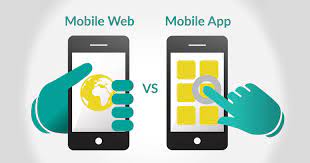


A website enhances the user experience across different types of mobile devices. In contrast, a mobile application requires developing a separate version for each operating system and device type. Users who own devices of different types may especially appreciate the benefits of compatibility that responsive websites provide. Besides, they support easy integration with other mobile features like QR codes and text messaging.
Mobile website’s becoming easy to reach a broader audience than a mobile app can reach due to the multi-device support that responsive web design provides across various platforms.
Websites also cost less to upgrade. Developer need to maintain just a single version of a them. Mobile websites let you change the content or design just by editing them once, and allow you to do that efficiently and flexibly Compared to mobile apps, which require downloading of every single update. After implementing, updates become active and visible immediately across all types of devices.
Mobile website can't leverage all smartphone features as efficiently. Unlike an application. Cameras, GPS, phone dialing, and other features integrated into mobile devices aren't always well developed for responsive/mobile websites, even though APIs and libraries aimed to help solve these issues have been appearing lately.
Since mobile experiences significantly differ from desktop experiences, implementing the same interface for both platforms may harm your UX strategy. This mostly relates to the single-window restriction. The single-window restriction says that a user shouldn't have to leave their current page to access all the content they're looking for; however, with mobile sites it's often impossible to fit everything onto one page.
Even if you design your mobile website in the lightest and most informative way possible, it still may work offline with only limited functionality using cached pages. Unlike a mobile application, which can run locally, a mobile website requires a good internet connection to operate fully.
Mobile apps provide better user experiences, load content faster, and are easier to use. Besides, unlike websites, apps have push notifications. Sharing updates, special features, and reminders within an app increases customer loyalty and retention.
Mobile apps are a great solution for services that require regular use. An application allows users to set preferences, create personal accounts, and keep vital information at hand. From a business point of view, mobile apps provide better support for targeting an audience and therefore building marketing campaigns for different groups of users.
Another crucial advantage related to mobile apps is the opportunity to use them offline. As apps are installed on a mobile device, they can keep providing access to content and features even without an internet connection.
A mobile application should meet the requirements of the particular operating system to ensure proper functioning. This means that every platform such as iOS, Android, and Windows are requires a separate app version. It's possible to develop a cross-platform solution that's supposed to fit every operating system and device.
When an application is developed for several different platforms, supporting it also takes more time and money. Actually, developer need to provide upgrades and fix compatibility issues for every type of device and do so regularly. Besides, inform users about these updates and push them to download the updated version of the app. Another issue related to maintaining an application is the time and effort needed to get approval from the markets where the app is placed.
8 Differences between Mobile Apps and Mobile Websites. (2021). Retrieved from https://www.biznessapps.com/blog/apps-vs-websites/.
Pros and Cons of Mobile Websites and Mobile Apps. (2021). Retrieved from https://rubygarage.org/blog/mobile-app-vs-mobile-website.